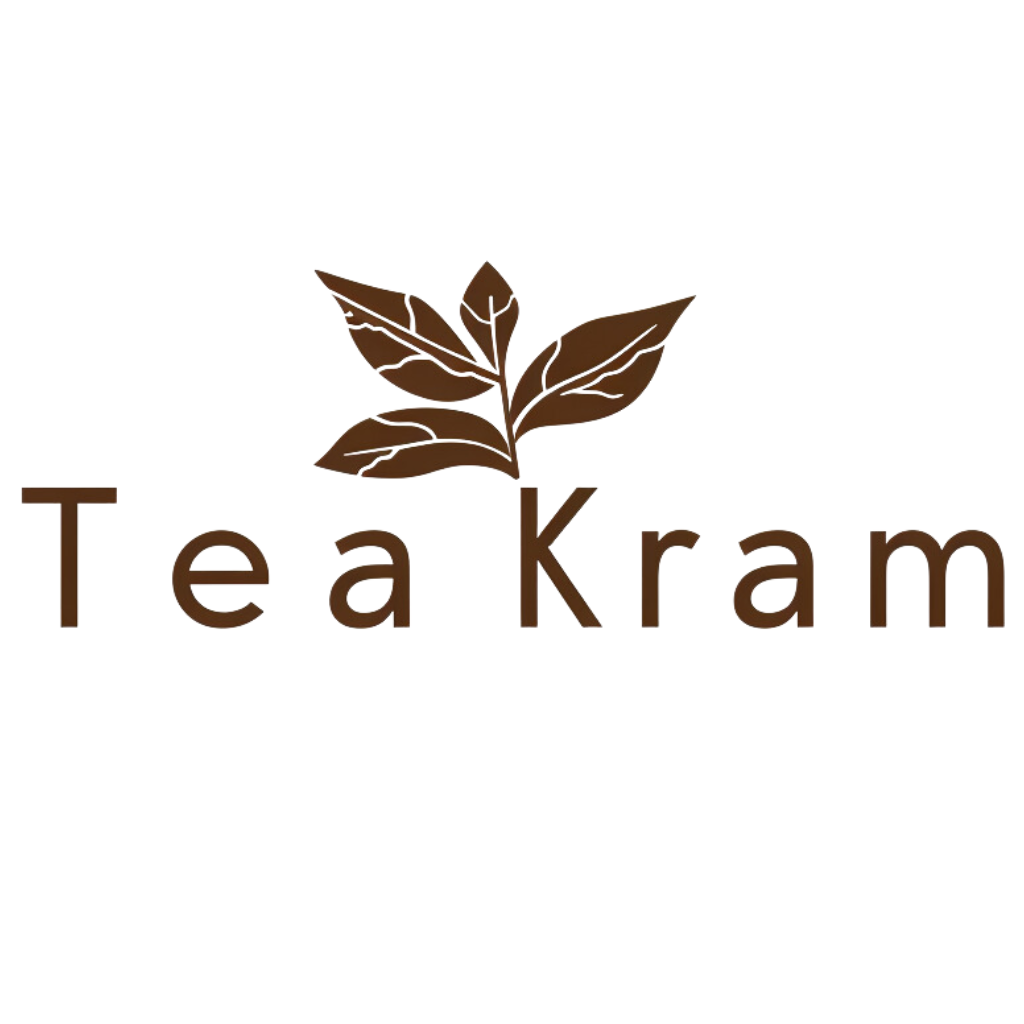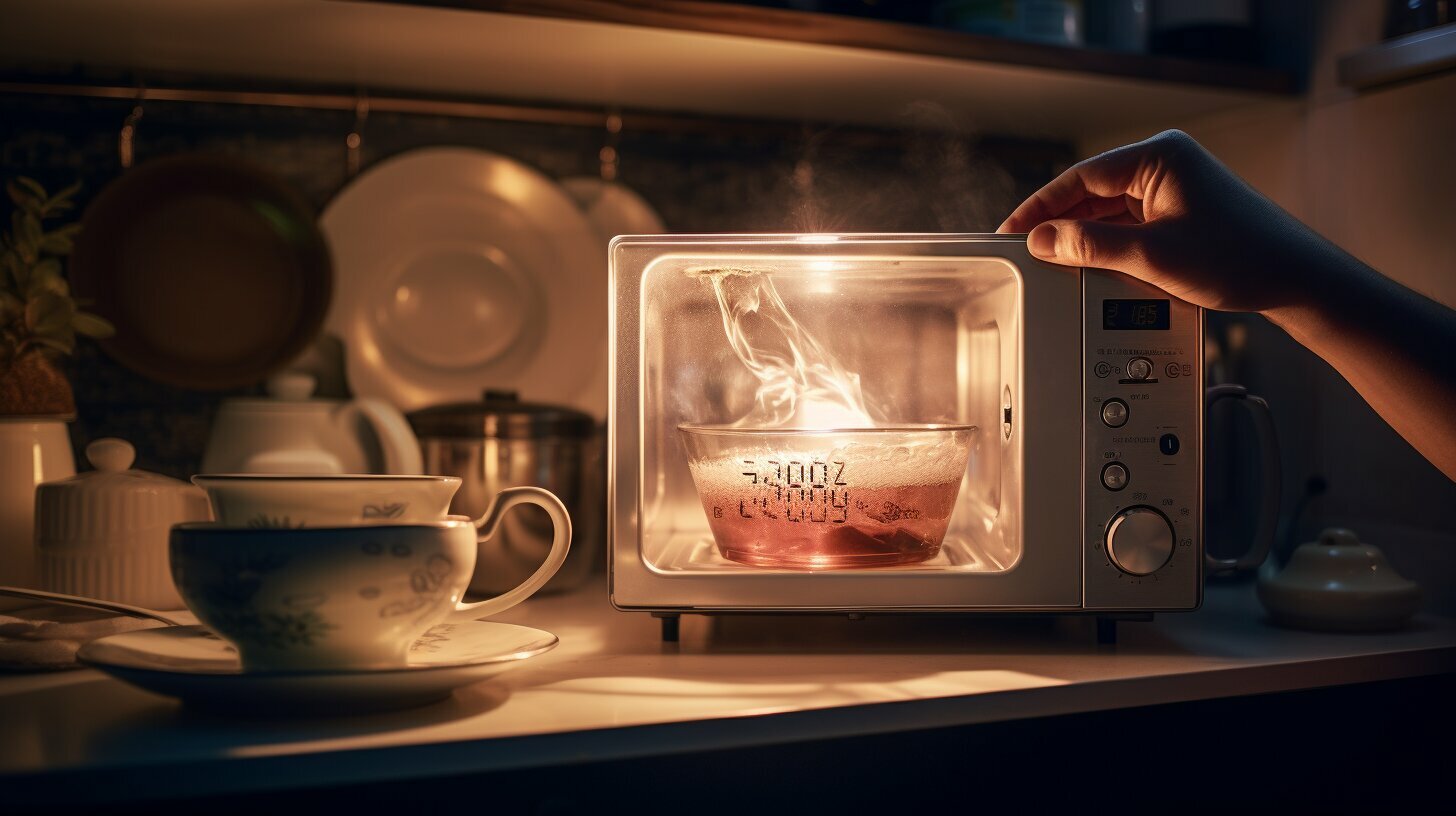As a tea lover, I know how crucial it is to get the temperature just right to make the perfect cup of tea. Microwaving water is a convenient and quick way to heat water for tea, but have you ever wondered how long to microwave water for tea? In this section, we will explore the optimal duration for microwaving water to make the perfect cup of tea. Let’s dive in.
Key Takeaways
- The optimal duration for microwaving water for tea depends on various factors like the volume of water, starting temperature, and microwave wattage.
- General guidelines can provide a starting point, but personal preference matters for achieving the perfect temperature for tea.
- It’s crucial to test the temperature of microwaved water before adding the tea leaves.
- Microwaving water for tea has advantages like convenience, but disadvantages like uneven heating and potential health risks.
- Alternative methods like stovetop and electric kettles can also be used to heat water for tea.
Factors Affecting Microwaving Time for Tea Water
Now that we know how long to microwave water for tea, let’s explore the various factors that can affect the best duration for microwaving water. It’s important to keep in mind that the optimal time for heating tea water may vary depending on the volume of water, the starting temperature, and the wattage of your microwave.
The volume of water you’re microwaving can have a significant impact on the duration required to heat it. Larger volumes will require more time to reach the desired temperature, whereas smaller volumes may heat up more quickly.
The starting temperature of the water can also impact the microwaving time. If the water is already hot or warm, it may require less time to reach the desired temperature. Conversely, if the water is cold, it will take longer to heat up.
Finally, the wattage of your microwave will also affect the best duration for microwaving water for tea. Generally, higher wattage microwaves will heat water more quickly than lower wattage models.
Factors Affecting Microwaving Time for Tea Water
| Volume of Water | Starting Temperature | Microwave Wattage | Optimal Duration |
|---|---|---|---|
| 8 oz (1 cup) | Room temperature | 600 – 700 watts | 1 – 1.5 minutes |
| 16 oz (2 cups) | Room temperature | 600 – 700 watts | 2 – 3 minutes |
| 8 oz (1 cup) | Cold | 600 – 700 watts | 2 – 2.5 minutes |
| 16 oz (2 cups) | Cold | 600 – 700 watts | 3 – 4 minutes |
These timings are based on a microwave with a wattage of 600-700 watts. If your microwave has a higher wattage, you may be able to heat the water more quickly, so adjust the duration accordingly.
By considering these factors, you can determine the best duration for microwaving water to make the perfect cup of tea every time.
General Guidelines for Microwaving Tea Water
Now that we understand the factors that affect microwaving time for tea water, let’s explore some general guidelines for microwaving. The ideal microwave time for brewing tea water typically depends on the wattage of your microwave and the amount of water you’re boiling.
For lower wattage microwaves (500-800 watts), microwaving one cup of water typically takes about 2-3 minutes, while two cups of water may take 3-4 minutes. For higher wattage microwaves (900-1200 watts), microwaving one cup of water takes about 1-2 minutes, while two cups of water may take 2-3 minutes.
It’s important to note that these timings are just a general guide, and you may need to adjust accordingly based on your personal preference and microwave wattage. Always use caution when removing the water from the microwave, as it will be incredibly hot and could cause burns if not handled carefully.
One helpful tip is to use a microwave-safe container with a lid to help trap the steam and maintain the temperature of the water. This can also help reduce the risk of spills and splatters while moving the hot water.
By following these guidelines, you can achieve a consistent and enjoyable tea experience every time. But remember, personal preference is key, so don’t be afraid to experiment and find the ideal microwave time for brewing your perfect cup of tea.
Adjusting Microwaving Time for Personal Preference
When it comes to microwaving water for tea, personal preference matters. Some like their tea hot, while others prefer it at a warm temperature. Adjusting the microwaving time is essential to achieve the desired temperature.
- Start with a shorter duration: If you’re unsure of the ideal microwaving time for your preferred tea temperature, start with a shorter duration. Microwave the water for 30 seconds and check the temperature. Repeat until you reach the desired temperature.
- Consider the starting temperature: If the water is already warm or at room temperature, it will require less time to reach the desired temperature in the microwave. Conversely, if the water is cold, it will take longer to heat.
- Factor in the wattage: The wattage of your microwave can affect the microwaving time for tea water. Lower wattage microwaves will require more time to heat the water than higher wattage models.
- Avoid overheating: Overheating the water can negatively impact the taste of the tea. To avoid this, keep an eye on the water and remove it from the microwave as soon as it reaches the desired temperature.
By considering these microwave water for tea timing tips, you can achieve efficient microwave water heating for tea and enjoy your cup of tea just the way you like it!
Testing the Temperature of Microwaved Tea Water
Once you have microwaved the water, it’s essential to ensure that it has reached the desired temperature for brewing your tea. A simple method to test the temperature is to use a thermometer. Insert the thermometer into the water and wait for the reading to stabilize. The recommended temperature for steeping most teas is between 160°F to 212°F.
If you don’t have a thermometer, you can use the following visual cues to estimate the water temperature:
- At 160°F to 170°F, the water will start to produce tiny bubbles on the bottom of the container.
- At 170°F to 180°F, the water will produce small bubbles rising to the surface.
- At 180°F to 190°F, the water will produce larger bubbles rising to the surface.
- At 190°F to 200°F, the water will produce streams of bubbles rising to the surface.
- At 200°F to 212°F, the water will produce a rolling boil with large bubbles and steam rising from the surface.
By using these simple methods, you can ensure that your microwaved tea water has reached the optimal temperature for brewing your favorite tea.
Pros and Cons of Microwaving Water for Tea
As a professional copywriting journalist, I have researched and discovered the advantages and disadvantages of microwaving water for tea. On one hand, microwaving is a quick and convenient method to heat water, especially for those with a busy schedule. It also saves energy compared to boiling water on a stovetop. Additionally, microwaving can bring water to precise temperatures, ensuring consistent and accurate tea brewing.
However, microwaving water for tea also has its downsides. Firstly, it can be challenging to control the temperature accurately, leading to over- or under-steeping the tea leaves. Secondly, some tea enthusiasts argue that microwaved water has a different taste compared to water boiled on a stovetop. It is also worth noting that heating water in a microwave can be dangerous if not done correctly, as it can cause overheating or even explosion if the container is not suitable for microwave use.
Considering all these factors, it is up to personal preference to decide whether or not to use a microwave to heat water for tea. If convenience and time-saving are essential, then the microwave is an excellent option. However, if taste and precision are more critical, then using a stovetop kettle or an electric kettle may be a better choice.
Alternative Methods to Heat Water for Tea
If you prefer not to use the microwave, several other methods can heat water for tea. One of the most traditional methods is using a stovetop kettle. Simply fill the kettle with the desired amount of water, place it on the stove, and heat it until it boils. Electric kettles are also a convenient option, as they quickly heat water to the desired temperature and automatically shut off when done.
For those who want to take their tea-making to the next level, investing in a temperature-controlled kettle may be worth considering. These kettles allow you to set a specific temperature for your water, ensuring it’s at the perfect temperature for your preferred tea.
Another alternative is using a hot water dispenser, which heats water to boiling and dispenses it on demand. However, it’s essential to note that hot water dispensers can sometimes give off a slight plastic taste, so it’s essential to follow the manufacturer’s instructions carefully and clean the dispenser regularly.
Ultimately, the choice of how to heat water for tea is a personal one, and each method has its own benefits and drawbacks.
Tips for Brewing the Perfect Cup of Tea
While microwaving the water is a crucial step to brewing a delicious cup of tea, there are a few additional tips that can enhance your experience:
- Choose high-quality loose tea leaves or tea bags from a reputable brand for the best flavor.
- Ensure the water is of good quality, ideally filtered to remove any impurities.
- Steep the tea for the recommended amount of time, usually between 3 to 5 minutes.
- Adapt the steeping time according to your personal preference, whether you prefer a stronger or milder taste.
- Consider adding honey, lemon, milk, or other additives to enhance the flavor or provide health benefits.
By following these tips, you can discover the perfect way to enjoy your cup of tea and make it a relaxing and enjoyable ritual.
Does Steeping Tea for a Longer Time Result in Better Flavor?
Steeping tea for a longer time can indeed result in better flavor. The key is to find the right balance. Over-steeping can lead to a bitter taste, while under-steeping may result in weak flavor. Experimenting with different types of tea and their suggested steeping times can help you discover how long to steep tea for optimal flavor.
Conclusion
In conclusion, as a copywriting journalist, I can confidently say that microwaving water for tea is a quick and convenient method that can produce consistent results. However, it’s essential to consider various factors that can impact the microwaving time, such as the volume of water, starting temperature, and wattage of the microwave. To achieve the perfect tea temperature, it’s crucial to adjust the microwaving time depending on your personal preferences. You can also test the temperature of the water before adding the tea leaves to ensure that it’s at the right temperature. While microwaving water for tea has its advantages, there are also alternative methods such as stovetop kettles and electric kettles that you can use. Ultimately, the key to brewing the perfect cup of tea is to experiment and find the right duration that works for you. I hope that this guide on how long to microwave water for tea has been helpful and that you can now enjoy a delicious cup of tea every time. Remember, whether you choose to use the microwave or not, these tips and techniques can help enhance your tea brewing process and elevate your tea-drinking experience.What is the Best Method for Making Iced Tea?
Looking to quench your thirst with a perfectly refreshing iced tea recipe? Look no further! Steeping loose-leaf tea in cold water overnight is the best method for achieving a smooth and flavorful iced tea. Add a squeeze of lemon and a touch of honey for the ultimate summer beverage. Enjoy the sweet satisfaction of a homemade glass of icy goodness.
In conclusion, as a copywriting journalist, I can confidently say that microwaving water for tea is a quick and convenient method that can produce consistent results. However, it’s essential to consider various factors that can impact the microwaving time, such as the volume of water, starting temperature, and wattage of the microwave. To achieve the perfect tea temperature, it’s crucial to adjust the microwaving time depending on your personal preferences. You can also test the temperature of the water before adding the tea leaves to ensure that it’s at the right temperature. While microwaving water for tea has its advantages, there are also alternative methods such as stovetop kettles and electric kettles that you can use. Ultimately, the key to brewing the perfect cup of tea is to experiment and find the right duration that works for you. I hope that this guide on how long to microwave water for tea has been helpful and that you can now enjoy a delicious cup of tea every time. Remember, whether you choose to use the microwave or not, these tips and techniques can help enhance your tea brewing process and elevate your tea-drinking experience.FAQ
How long should I microwave water for tea?
The recommended microwaving time for tea water depends on the wattage of your microwave and the desired temperature. As a general guideline, start with 1-2 minutes for a standard 1000-watt microwave and adjust as needed. It’s best to use a thermometer or check for steam to determine if the water has reached the desired temperature.
What factors affect the microwaving time for tea water?
Several factors can impact the microwaving time for tea water. These include the volume of water being heated, the starting temperature of the water, and the wattage of your microwave. Larger volumes of water and colder starting temperatures will require longer microwaving times, while higher wattage microwaves will heat water faster.
Are there general guidelines for microwaving tea water?
Yes, there are some general guidelines for microwaving tea water. For a standard 1000-watt microwave, a good starting point is 1-2 minutes for 1 cup of water and gradually increasing the time for larger volumes. However, it’s essential to adjust the duration based on your microwave’s wattage and personal preferences.
Can I adjust the microwaving time to suit my personal preference?
Absolutely! Adjusting the microwaving time allows you to achieve the desired temperature for your taste buds. If you prefer your tea water hotter, increase the microwaving time, and if you like it slightly cooler, decrease the duration. Keep experimenting until you find the perfect duration that suits your preference.
How can I test the temperature of microwaved tea water?
There are a few simple methods to test the temperature of microwaved tea water. One method is to use a food thermometer to measure the temperature directly. Alternatively, you can observe the water for steam or bubbles, which indicate that the water is hot enough for brewing tea.
What are the pros and cons of microwaving water for tea?
Microwaving water for tea has its advantages and disadvantages. The pros include convenience, speed, and energy efficiency. On the other hand, some people believe that microwaving water can affect the taste or quality of the tea. It ultimately comes down to personal preference and weighing the pros and cons for yourself.
Are there alternative methods to heat water for tea?
Yes, if you prefer not to use the microwave, there are alternative methods to heat water for tea. Stovetop kettles, electric kettles, and even traditional tea kettles are popular options. Each method has its advantages and can provide a different tea brewing experience.
Any tips for brewing the perfect cup of tea?
Absolutely! Here are a few tips for brewing the perfect cup of tea: use high-quality tea leaves, steep the tea for the recommended duration, use the right water temperature for the type of tea, and ensure proper storage of your tea leaves. Experiment with water-to-tea ratios and steeping times to find your preferred taste.



